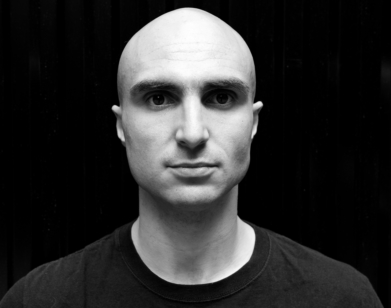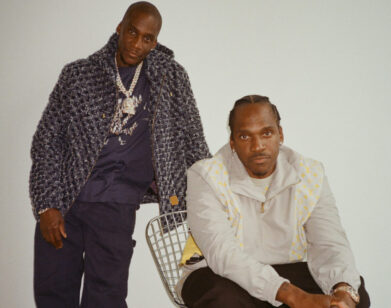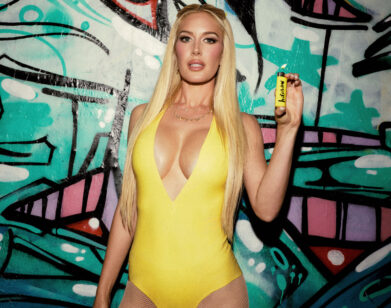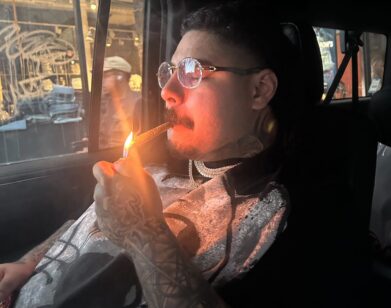IN CONVERSATION
Devon Welsh And Sean NicholasSavage Aren’t Afraid of Sincerity
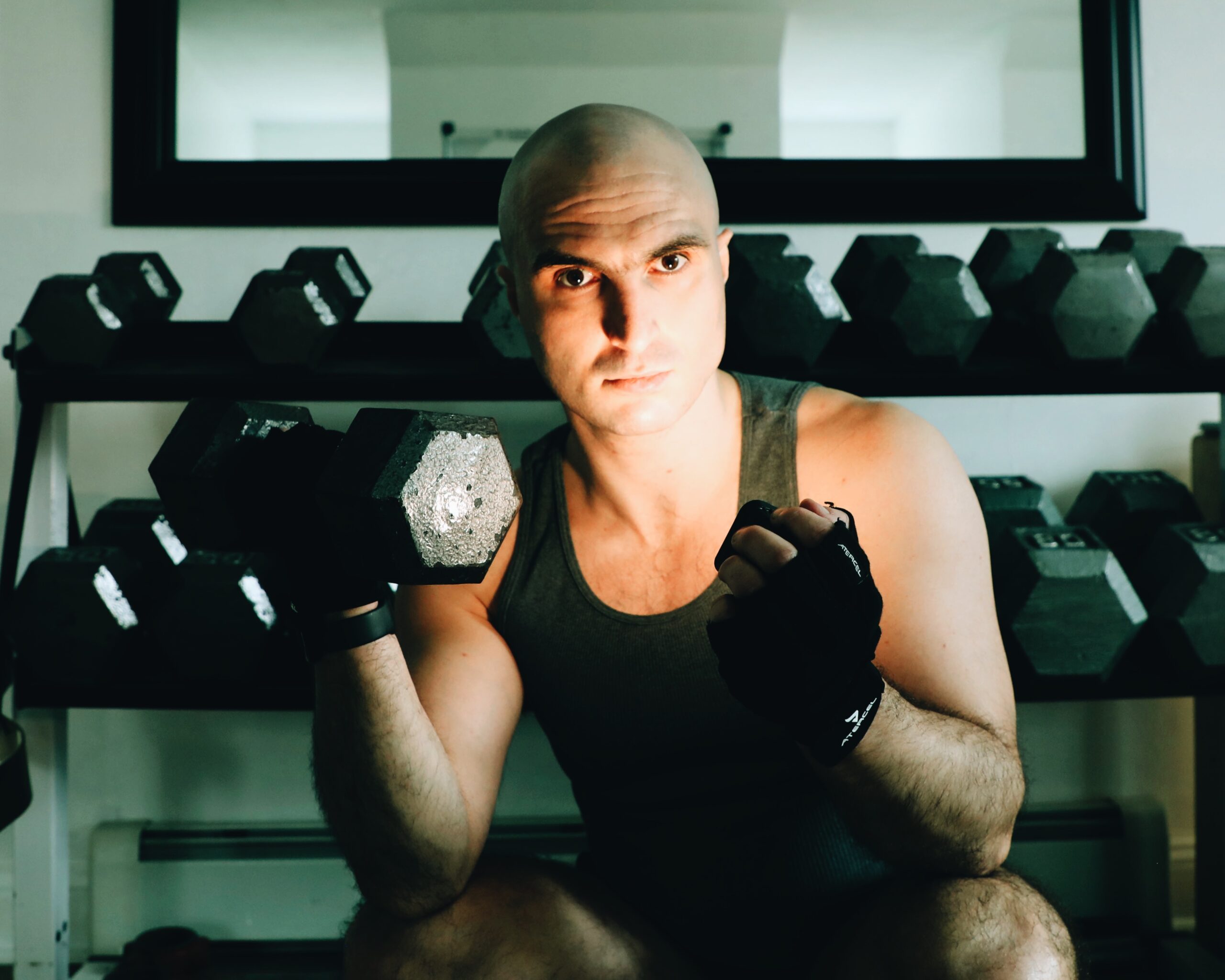
Devon Welsh, photographed by Nika Roza Danilova.
Canadian musician Devon Welsh was thinking far outside the box for his first album release in five years. Come With Me If You Want To Live is inspired by Terminator and is intended to serve as the soundtrack to a hypothetical action movie. Fittingly, it features up-tempo synths and a highly amusing, video game-inspired music video for its lead single, “You Can Do Anything.” “It reminded me of John Connor playing at the arcade before the Terminators got to them,” remarked his friend and fellow musician Sean Nicholas Savage when the two of them got on the phone a few weeks ago. “Something about it gives me this idea of a future that we had before that we don’t anymore.” While catching up, the two Canadians connected over their embrace of sincerity, a shared love of poetry, and the pain of having to explain their vocations to bemused border agents.
———
WELSH: How’s it going, man?
SAVAGE: Great. Good to see you.
WELSH: I’ve been listening to all your music and videos and interviews and stuff, so I feel like I’ve been hanging out with you.
SAVAGE: Yeah, we haven’t talked in a while. You used to have an Instagram that was just poetry, right?
WELSH: Yeah, I did. I deleted my Facebook and my Instagram in 2022.
SAVAGE: Because it’s toxic?
WELSH: Yeah. My dad had gotten sick and then he died, and that was a whole saga.
SAVAGE: I’m sorry.
WELSH: It’s all right. But by the end of that, I was like, “Fuck this.” I felt that life became more basic at a time when somebody’s sick. I was just like, “I don’t need this in my life. I don’t want somebody who doesn’t know me to be able to contact me out of the blue. I don’t want to see people’s lives that I don’t really know.”
SAVAGE: When something like that’s happening, people often will drop the things they’re putting up with.
WELSH: Totally. But I did love using Instagram for sharing poetry, and I miss that. Do you share poetry on the internet?
SAVAGE: Yeah and it was funny, I was thinking about you, and then you wanted to talk. We do have this artistic similarity, a minimalism, that I don’t know many other artists have. I write different poetry, but there’s something kind of the same about it.
WELSH: Definitely.
SAVAGE: I really admire how you were making it public. When I write, it’s a safe space for me to explore my thoughts outside of my head and have a jam session, but it’s scary to share.
WELSH: That’s one of the things that I was thinking about when I was watching your videos and listening to your music. This sounds like mutual masturbation–
SAVAGE: That’s not masturbation, that’s love-making.
WELSH: We’re making love, yeah. We have similarities in our music and the attitude we have as artists. I really admire the bravery in your music. Your emotions are often on your sleeve. They’re very sincere and heartfelt and the music will be minimal, and the emotions will be simple in the sense that any kind of real emotional expression has a simplicity to it. I was wondering how you maintain that willingness to walk that tightrope in your music.
SAVAGE: It’s a practice of sharing certain things, but usually the cringey elements are interesting to me. When something’s coming out and I’m feeling a no, then I’m like, why? It’s about pushing boundaries for myself. This political installation art direction that you were going in, I was just cheering for it, but it’s not as aesthetically functional, perhaps.
WELSH: For sure.
SAVAGE: Sometimes I think artists are worried if they do that for a bit and then come back around, it’s like there’ll be nobody there when they start singing sweetly again.
WELSH: I know.
SAVAGE: Talk about being brave. That’s just what it is. I’m going to complete the task. And if people think it’s not going to succeed, well, that’s not my job.
WELSH: Right.
SAVAGE: I’m going to ping pong that question back to you. How do you stay grounded or feel safe doing that? Or with Click Here Now!, were you having a manic moment?
WELSH: I was having a manic moment, but it was when the pandemic started and all of this craziness was happening, I needed to capture the way it felt for me. There wasn’t a whole lot of thought behind it. But that music’s not particularly emotionally sincere. It’s more cynical. I feel like in some of your videos you’ll do something not too dissimilar, in the sense that you’ll sometimes pair an incredibly sincere, beautiful song with a video that has a sense of humor to it. Like that song “Harmony” where you made the video with Jasper [Baydala]. That video is fucking amazing.
SAVAGE: Oh, yeah.
WELSH: When you think about what the expectations for a video are supposed to be or something like that, and then you look at that video, there’s a kind of flipping of the bird to music videos, but it’s also super touching. The humor of the video can give you a bit of a break from the emotional impact of the song. What did that video mean to you?
SAVAGE: I used to get that a lot when I was younger, when things were a little bit more culturally bro-y or something. Fans would be like, “It’s all a joke, right? It’s all an act?” It would drive me crazy. I might be laughing but I am very sincere. I don’t know if I’m trying to be ironic.
WELSH: There’s something about the sense of humor that communicates the sincerity of the art even more. For example, on my album, Come With Me If You Want to Live, the cover with the buff shirtless man is funny, but I also find it to be touching too, in a way. It’s not ironic in the sense that it’s all a prank. I found that the “Harmony” video of yours is similar.
SAVAGE: Thank you so much for making this album. I have been jamming it.
WELSH: My pleasure.
SAVAGE: For this album, it reminded me of John Connor playing at the arcade before the Terminators got to them, hanging out by the river. There was this era of ideas about what the future was supposed to be like. Before Apple, when they showed a spaceship, it had tons of hardware on it. Now it’s all white, and everything’s very user-friendly. The musical aesthetic isn’t like, 16 bit-esque at all, but something about it gives me this idea of a future that we had before that we don’t anymore.
WELSH: Cool, yeah.
SAVAGE: I always admired how older songwriters could talk about the scope of their life or tell a life story. And I obviously would just be making shit up if I did that in my early twenties. I’m in my mid-thirties now, and I always think before an album when I’m writing lyrics, “Last chance to talk about certain people, last chance to talk about certain times.” Now in my mid-thirties, you can talk about stories with almost a beginning, middle, and end, because it’s been enough time.
WELSH: That’s so true. I relate to that idea of when you make music, you consider that it might be the last project that you do, but that’s really important. It gives you some clarity about what you want to write about.
SAVAGE: So many things that I can’t figure out a way to say. Still haven’t said them.
WELSH: It’s really fucking terrible. Shine is your most recent release, right?
SAVAGE: I’ve put up singles since then, but Shine was the last album.
WELSH: “A belief or faith there’s more to each of us than is expressed or documented and about seeing that in others, and also just seeing that in yourself or anything.” I was reading that before we talked, and it’s so true. There’s some things that you just can’t really write about.
SAVAGE: And that’s what poetry is all about.
WELSH: Yeah. That’s what got me excited about music in the first place when I was really young. The first thing that I was into was poetry when I was a kid. I really liked poetry.
SAVAGE: That’s funny. You’re such a good poet.
WELSH: Then I started to get into music because I’d be doing poetry readings in high school and then at university, and I’d be trying to get more emotional than people generally would at a reading. They would be reading kind of hunched over and not be very dramatic about it. I found that with music, you could bring even more emotion to words than if you just have words on their own. You can say something indirectly by having the words be expressed and the music brings this completely different element to it. The two of them together kind of contrast with each other.
SAVAGE: 4D.
WELSH: Exactly. Then you have this extra tool to try and express something. It’s almost like there’s this race to try to express as many things as you can, as clearly as you can, while you still can. Maybe ultimately, you’re never going to be able to express it all.
SAVAGE: Hopefully not. Sometimes I’m trying to say one thing and I end up saying something else, and if it’s worth it, then it’s good. Sometimes if I say something too clearly, it’s a little too clear.
WELSH: Most of the time my songs end up being about something completely different, and that’s just how it goes.
SAVAGE: I want to talk about your performances. They’re masterful, minimalist, solo performances with lots of silence, and filled with energy and emotion. And on Come With Me If You Want to Live, you’re talking about being different ages.
WELSH: Yeah, I wrote that song when I was about to turn 27, actually, so a long time ago.
SAVAGE: That’s the best shit.
WELSH: It takes on this entirely different character to release it when I’m 35. It’s strange, I made the record and since then I took this huge break from even writing music. I had that muscle strengthened for a long time, and the muscle isn’t strong anymore. Writing is an intimidating thing for me at this time. I need to get jacked in a creative sense again.
SAVAGE: But you forget that you’re learning life. When you get back into it, you’ll remember. It’s really important to sometimes to completely become not an artist anymore.
WELSH: Yeah, that’s where I have been. I’ve been writing for a local paper here in central Wisconsin for the last six months, and that’s been cool because I’m learning an entirely new thing. Even preparing to talk to you, listening to your music, I’m like, “Wow, that’s an artist.”
SAVAGE: You’re projecting. Thank you.
WELSH: No, seriously. It reminded me of how powerful music can be. I need to dip my toe into that again.
SAVAGE: Yeah, someone can do something really incredible in 1978 when they’re 21 years old, and then in 2015, they have had many lifetimes of all kinds of non-related horrible stuff. They’re lying on their couch and someone out there is going, “I wish I could be them.” My hero. And you’re like, “I don’t know who that hero is.”
WELSH: I know.
SAVAGE: I love the writeup that’s on Bandcamp. That is unbelievable. But you didn’t write that. Max Paragon wrote that?
WELSH: Yeah. Max Paragon is a journalist. He’s going to be covering my record very shortly. And with the bio I didn’t want to just do another bio for another record. I thought, “Let’s do a bio where it’s like a Mad Max action scene.”
SAVAGE: Yeah, my bio is so absurd.
WELSH: How so?
SAVAGE: I got better things to do than update my bio.
WELSH: Exactly.
SAVAGE: Using words to describe the reason I make the music is to describe the indescribable.
WELSH: I know. When you’re talking to someone, and they say, “What kind of music do you make?” What do you say?
SAVAGE: This happens a lot. I say that I make ballads. You know what’s so funny, though? When I was coming into the States, the person at the border was like, “You’re an artist. What kind of artist?” I said, “I’m a performer and writer. Like, music.” And they were like, “What kind of music?” And I said, “Ballads.” And they were like, “What’s that?” I said “Ballads” a couple of times, and they were like, “I don’t know what that is.” Eventually, I said “Love songs.” And they were like, “Huh?”
WELSH: [Laughs].
SAVAGE: Really weird. Isn’t that a very common phrase?
WELSH: Talking to border agents is always strange. I’ll say I’m a musician and they’ll say, “What kind of music do you make?” It’s like, “Oh, I don’t know. It’s like emotional pop music or something.” And then they’ll say, “Why are you doing that?”
SAVAGE: Because I couldn’t get a job at the border! They weren’t hiring.
WELSH: Yeah. So are you living in L.A. right now?
SAVAGE: I’m between Montreal and New York.
WELSH: Love that.
SAVAGE: I know you’ve been in Wisconsin for a long time.
WELSH: Yeah, since 2019. I live in Central Wisconsin, in a rural area.
WELSH: We’re both invading a foreign country. I was curious about the cover of Shine. Can you tell me about shooting that?
SAVAGE: I noticed that there’s this film called Shine, which has very similar artwork. Not a great movie. But when I told Mac DeMarco my idea, he was like, “Like that movie?” We went to the ocean and I wore all my clothes and kept jumping out of the water, trying to create that image. Mac took the photo and there were lots of people on the beach looking and laughing at me.
WELSH: Oh, really?
SAVAGE: I don’t know what month it was, but it was cold. When we were in the car driving back, Mac handed me the camera, and I was like, “It’s the exact image that I imagined.”
WELSH: That’s awesome. All your covers are really good. And that album is fantastic.
SAVAGE: Thank you. I really like the drums on your record. They add a lot of the character.
WELSH: Thank you.
SAVAGE: We’ll just talk forever, I guess.

